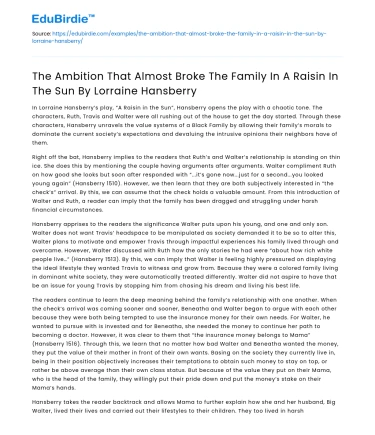In Lorraine Hansberry’s play, “A Raisin in the Sun”, Hansberry opens the play with a chaotic tone. The characters, Ruth, Travis and Walter were all rushing out of the house to get the day started. Through these characters, Hansberry unravels the value systems of a Black Family by allowing their family’s morals to dominate the current society’s expectations and devaluing the intrusive opinions their neighbors have of them.
Right off the bat, Hansberry implies to the readers that Ruth’s and Walter’s relationship is standing on thin ice. She does this by mentioning the couple having arguments after arguments. Walter compliment Ruth on how good she looks but soon after responded with “...it’s gone now...just for a second...you looked young again” (Hansberry 1510). However, we then learn that they are both subjectively interested in “the check’s” arrival. By this, we can assume that the check holds a valuable amount. From this introduction of Walter and Ruth, a reader can imply that the family has been dragged and struggling under harsh financial circumstances.
Save your time!
We can take care of your essay
- Proper editing and formatting
- Free revision, title page, and bibliography
- Flexible prices and money-back guarantee
Hansberry apprises to the readers the significance Walter puts upon his young, and one and only son. Walter does not want Travis’ headspace to be manipulated as society demanded it to be so to alter this, Walter plans to motivate and empower Travis through impactful experiences his family lived through and overcame. However, Walter discussed with Ruth how the only stories he had were “about how rich white people live…” (Hansberry 1513). By this, we can imply that Walter is feeling highly pressured on displaying the ideal lifestyle they wanted Travis to witness and grow from. Because they were a colored family living in dominant white society, they were automatically treated differently. Walter did not aspire to have that be an issue for young Travis by stopping him from chasing his dream and living his best life.
The readers continue to learn the deep meaning behind the family’s relationship with one another. When the check’s arrival was coming sooner and sooner, Beneatha and Walter began to argue with each other because they were both being tempted to use the insurance money for their own needs. For Walter, he wanted to pursue with is invested and for Beneatha, she needed the money to continue her path to becoming a doctor. However, it was clear to them that “the insurance money belongs to Mama” (Hansberry 1516). Through this, we learn that no matter how bad Walter and Beneatha wanted the money, they put the value of their mother in front of their own wants. Basing on the society they currently live in, being in their position objectively increases their temptations to obtain such money to stay on top, or rather be above average than their own class status. But because of the value they put on their Mama, who is the head of the family, they willingly put their pride down and put the money’s stake on their Mama’s hands.
Hansberry takes the reader backtrack and allows Mama to further explain how she and her husband, Big Walter, lived their lives and carried out their lifestyles to their children. They too lived in harsh societies. Though the past society and the current society both portray colored people as inferiors, the old generation was threatened to be lynched or shot at while the current generation has a fear of living in a low class their entire life. However, through these circumstances, Big Walter and Mama continued to provide unconditional love for their children. With this reasoning when Mama “lost their baby Claude”, she was “going to lose Big Walter too” (Hansberry 1519). Even though having an additional baby would add to their financial stress, they were able to easily put that aside and raise the child out of love and comfort from them. They believe that the social status of classes did not hold the same value, nor near the value of the family connection.
The story then takes a turn when Hansberry addresses that Mama was ready to give up the insurance money just to provide for her dear children, Walter and Beneatha. Mama, of all the characters in this play, demonstrated the most value in the family. When Walter broke down and almost gave up on his dream to invest in the liquor business, his Mama saved him by giving him all she had left. Mama felt “helpless” and wished she could give more to her children to easily reach their dream. After giving him the large sum of money, Mama continues on by entitling Walter as the “new head of this family” (Hansberry 1547). Being the head of a family comes with great responsibility since he or she is in charge of the family’s well-being. Mama entrusted that her kids knew what they were doing because she put so much value in them, as Big Walter did. By doing so, we can simply conclude that the value their family has within each other is also adjacent to having unconditional love with one another.






 Stuck on your essay?
Stuck on your essay?

